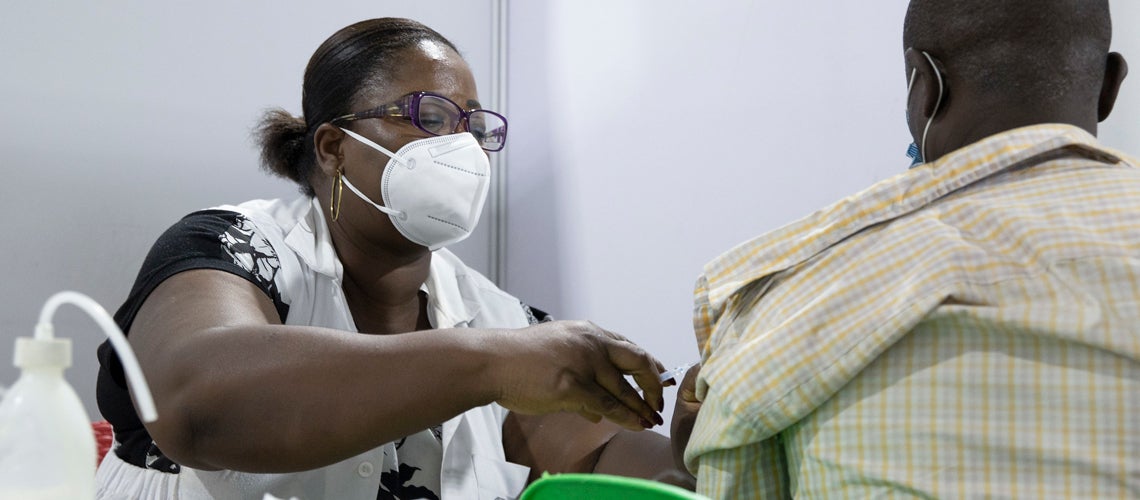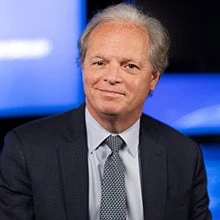 A mass vaccination tent in Abidjan, Cote d’Ivoire. Photo: Erick Kaglan/World Bank
A mass vaccination tent in Abidjan, Cote d’Ivoire. Photo: Erick Kaglan/World Bank
The COVID-19 pandemic is far from over, and vaccines remain our most important tool for helping every country overcome it and get on the path to recovery.
Since February, much of the world’s attention has shifted to Russia’s invasion of Ukraine and the risks it poses to global supplies of food and energy. And the war is coming on top of many other crises – climate change, conflict in many other places, record numbers of refugees, and a rise in poverty for the first time in decades. But even among these daunting global challenges, COVID has particularly far-ranging health, social, and economic impacts, especially for the poorest countries and most vulnerable people.
Yet, thanks to vaccines, we have the means to end the pandemic worldwide, if we can stay focused and maintain our ambition. That’s why, at our recent Spring Meetings, the World Bank Group joined with the U.S. government and the COVID-19 Vaccine Delivery Partnership, supported by WHO, UNICEF and GAVI, to host an event on “Scaling Up Vaccine Deployment.”
We convened leaders of global, regional, and bilateral agencies, along with a select group of finance and health ministers from developing countries, to discuss how we can turn vaccines into vaccinations. We wanted to bring more clarity about what needs to happen urgently so that vaccine supplies get quickly to where they’re needed – and so that countries have the resources and capacity it will take to get everyone vaccinated
We discussed findings from a report that we’d prepared for the G20 in close collaboration with our Multilateral Leaders Task Force partners and the COVID-19 Vaccine Delivery Partnership. It emphasizes that we can join forces and bring funding and expertise to help low- and middle-income countries deliver vaccines in the short term. And with countries in the lead, we can also support longer-term efforts to build pandemic preparedness and strengthen health systems. But we need a broad-based global commitment, both to overcome COVID now and to build resilience for future health crises.
Despite progress on vaccination – including considerable success in some developing countries – the global effort still presents a huge, unacceptable gap between rich and poor nations. While 11.5 billion doses of COVID vaccines have been administered worldwide, only 12% of people in low-income countries are fully vaccinated, compared with over 74% in wealthier countries. And 18 countries, mostly in Africa, have yet to vaccinate even 10% of their people. In these places, not even a third of health care workers and elderly people have gotten a vaccine. We can and must do better.
On the bright side, we now have enough global supply of COVID vaccines, and this removes a binding constraint that had slowed vaccination efforts for more than a year. Vaccines remain highly effective at reducing serious illness and deaths, even as the virus has continued to mutate. We also have a comprehensive toolkit of tests, treatments, and personal protective equipment to help limit infections.
The core challenge now is to get these tools to every country– while also making sure that governments and communities continue to commit to their national vaccination effort, particularly in Africa. Demonstrating political leadership and social determination to further advance vaccination coverage will be a strong signal for future vaccine manufacturing capacity in the region. Although health risks remain the most urgent concern, success in vaccination is also the cornerstone to every country’s economic and social recovery. We can only emerge from the pandemic by getting many more shots into people’s arms.
Our session at the Spring Meetings made me optimistic that we have built a strong and truly global coalition on vaccines. We will need a collective determination to succeed in helping countries vaccinate at a scale that protects the most vulnerable quickly (the elderly, the immunocompromised, as well as health workers), reduces the wide range of threats posed by COVID, and puts us all in a stronger position to deal with future pandemics. The World Bank is committed to doing all we can to help, in close partnership with other organizations and the governments of our client countries. We all need to be ambitious in this effort, and to stay focused on seeing it through.


Join the Conversation